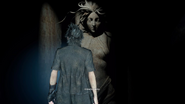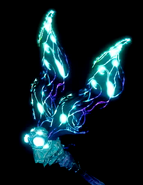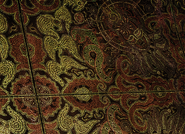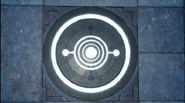Template:Sideicon Pitioss Ruins is an optional dungeon in Final Fantasy XV located in the Hulldagh Pixe in eastern Lucis. It is only accessible on the Regalia Type-F. The player must complete a series of increasing difficult puzzles to locate the Black Hood accessory. Access to the dungeon is required to complete the sidequest, Stealing The Past.
The dungeon's entrance is magically sealed and will only open at night. To leave the area, the player take off on the Regalia again, or can select "Tow to Hammerhead" to pay gil to fast-travel to Hammerhead.
It is unknown how old Pitioss Ruins are, but the construct is part of the ancient civilization of Solheim that fell 2000 years ago. It is a dungeon where the laws of physics were distorted into a training ground for an unknown purpose. Solheim working with time-space distortions is also seen with Omega, which appears in Insomnia from a warp point that has Solheim's insignia, also prominently seen in Pitioss Ruins. Whether Omega and Pitioss are connected however, is unknown, Omega having been built as a weapon to fight the gods.
Almanac
At the entrance to the dungeon.
- Ancient Solheim training grounds situated in southwestern Cleigne and shrouded in mystery. Hidden among the mountains and conspicuously missing from all conventional maps, these ruins appear to have been all but forgotten in the modern age.
- Traveling the world is sure to open one's eyes to the sheer variety of climates and cultures around Eos, but the one thread tying all lands together is the presence of peculiar stone structures. The toppled towers and shattered statues seen across the continent are testaments to the artistry and ingenuity of those who came before us, and Pitioss may indeed stand as Solheim's crowning achievement.
- But the most incredible aspect of ancient technology is its ability to seemingly manipulate time-space as we know it. Based on out current scientific understanding, every bend in the fabric of our universe must be counterbalanced elsewhere—our scholars suspect these ruins might be the space in which those interdimensional kinks are worked out.
Layout
The Pitioss Ruins are unique among other dungeons in Final Fantasy XV, both for their aesthetic and their progression. The dungeon's design is dominated by glowing orange spikes, numerous statues of unknown figures, and in its deepest chamber, a giant stone statue of a woman holding a sword over her head; the identities of the figures are unknown, but the giant statue of the woman appears to be the focal point of the ruins, being found in their deepest point before the player begins their return to the surface.
The player controls only Noctis in Pitioss, there are no enemies whatsoever, and it is navigated by platforming segments, the player being required to navigate moving platforms and make difficult jumps to forge deeper. Spiked surfaces appear in the dungeon and must also be avoided. Unmarked checkpoints throughout the dungeon teleport Noctis back to them if he touches a spiked surface or falls off a platform. Monoliths in the dungeon project red energy barriers that block off areas until they are destroyed, which will create shortcuts through the area in a manner of preserving progress.
The Pitioss Ruins are divided into roughly three sections. The first section includes numerous fiendish statues and a single large statue of a human male, and the player can move about large iron balls to knock down obstacles to proceed. After falling through a large rotating golden globe, the player proceeds to the second area, a long hall with several staircases that segment off rooms. Each room has its own challenge to complete to trigger the switch that opens the next room, and the final room prominently features a gigantic mechanism of sliding spiked rollers dominated by a demonic visage.
The third and final section is the deepest part of the ruins. The rooms appear to be tilted 45 degrees, causing everything to be at an angle. After navigating this part of the maze the player comes upon a large statue of a female figure. Here the platforms about the room rotate along the walls, and after the player makes their way to the front of the statue and leaps onto it, the statue falls backward. Climbing up the woman's arms and sliding down her sword a significant distance leads the player to a lift and several valuable items.
At the top of the lift the player crosses a series of steel beams overlooking the statue below, which eventually take them back to the first section where new areas can be explored. This path eventually takes the player to the "end" of the dungeon, a ledge looking outside with the unique Black Hood accessory on it.
Quests
Stealing The Past
To begin this quest the party must first enter the town of Lestallum at nightfall, on the far east of the town the party will be able to eavesdrop a conversation by a window. After listening to the conversation the quest will begin and the party will be tasked with locating the Magitek Booster. First the party must head to the tipster at the Verinas Mart - Ravatogh outpost who will direct the party towards the Pitioss Ruins.
To reach the Pitioss Ruins the party must unlock the Regalia Type-F and fly to the location just north of the Rock of Ravatogh. Upon landing the party must venture north through a variety of tough foes.
As the party reach the exterior of the Pitioss Ruins the Magitek Booster can be found on the right hand side of the entrance. Collecting the Magitek Booster ends the quest and the party will receive 50,000 EXP.
Acquiring the Black Hood
As the party enters the Pitioss Ruins it will disband and Noctis will be left to progress the dungeon alone. As Noctis enters the ruins the map will cease to function and the player must progress through the puzzle-themed dungeon. There are no enemies within the dungeon.
The puzzles become increasingly difficult until Noctis reappears above the entrance where the Black Hood lies.
Creation and development
Pitioss Ruins was designed by one person: it was planned to be a standard endgame dungeon and Director Hajime Tabata recruited an artist named Hiroyuki Nakamura to design it, who had previously worked on textures for the game. The team felt like that an unexpected last dungeon would be good and allowed Nakamura to "run free with his ideas and create the dungeon as he liked."[1]
There were discussions about aligning the direction of the dungeon with some of the others in the game, but ultimately it was decided to be another kind of offering within the game. The staff in charge of Pitioss were passionate about including it as part of the endgame content. Tabata has said that although having consistency throughout a world is great, he wanted players to be able to enjoy a dungeon made with the level of passion Pitioss's designers exhibited, even if it was at the price of losing that consistency.[2]
Intrigued by the ruins' imagery, elaborate fan theories have sprung up to analyze it. Director Hajime Tabata has denied the "Pitioss Ruins' story" fan theory, adding that there are aspects of the game's background lore that will be explained in future downloadable content.[1] He has also said Pitioss Ruins were left by the ancient civilization of Solheim, and that even the most unassuming places in Eos have a depth and a history to them whose mysteries are waiting to be unlocked.[2]
Gallery
Trivia
- In the launch version nothing happened when Noctis left the Pitioss Ruins. After a certain patch, if Noctis did not complete the ruins, Ignis asks Noctis how he fared and Noctis replies there is nothing fair about the ruins. Once Noctis obtains the Black Hood or leaves using the exit where the hood is located, Noctis will mention he solved all the puzzles fair and square and that his brain hurts.
- Both Insomnia and Altissia have numerous statues about them. The Almanac entry for Pitioss posits that the "shattered statues seen across the continent" are testaments to the artistry of those "who came before us." The Lucian royal line even figured out in ancient times how to seal souls in statues. The four modern nations of the world were established in the wake of Solheim's collapse.
- Pitioss Ruins is implied to have something to do with technology that warps space-time. The Almanac entry posits that every "bend in the fabric of our universe must be counterbalanced elsewhere," and that it is suspected Pitioss Ruins is the space in which those "interdimensional kinks" are worked out.
- Interdimensionality in Final Fantasy is commonly linked to the Void, the world of formation that links the series's multiverse.
- In the Fabula Nova Crystallis: Final Fantasy series that Final Fantasy XV started as part of, interdimensionality is associated with the juxtaposition of the mortal realm and the unseen realm, the gods' plan being to open the gate to the latter. The gate and the goddess who operated it were an influential part of the early version of the game as Final Fantasy Versus XIII, but the statues of a woman in Pitioss may be entirely unrelated.
- The Almanac describes Pitioss as "ancient Solheim training grounds." This could hearken to the arks from the Final Fantasy XIII games, built by ancient fal'Cie as training grounds for l'Cie in preparation for the opening of the gate to the beyond and the Day of Reckoning.
References
- ↑ 1.0 1.1 Final Fantasy XV's Wild Secret Dungeon Was Designed By One Man (Accessed: UnknownError: See this for how to archive.) at Kotaku
- ↑ 2.0 2.1 Xbox: The Official Magazine February 2018 Issue 160








